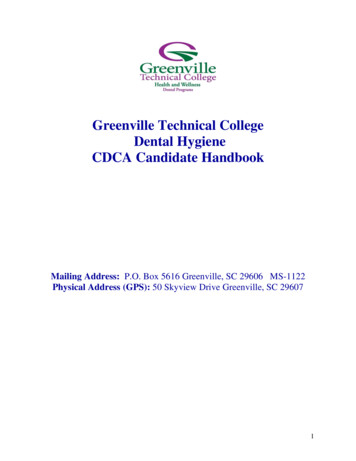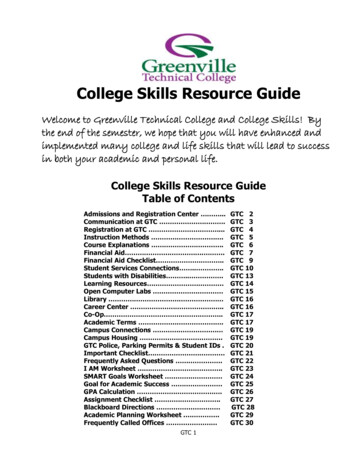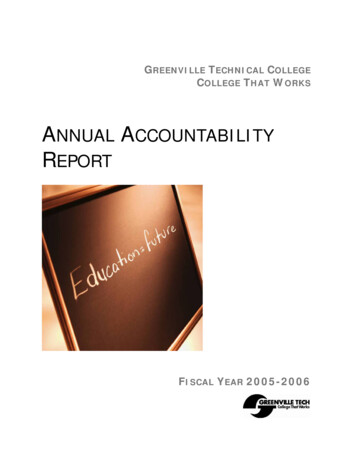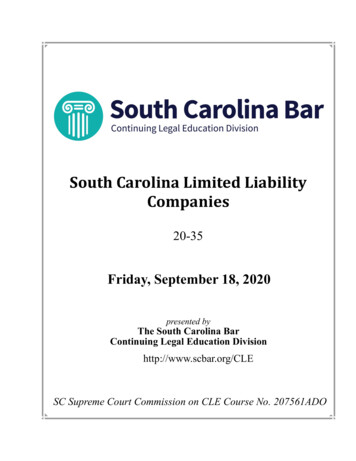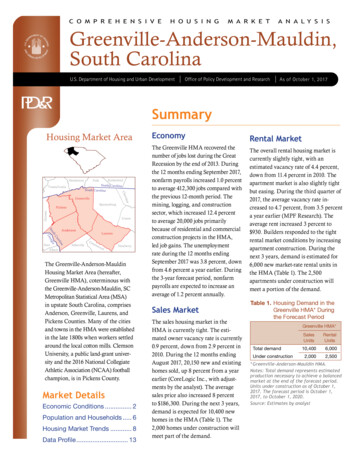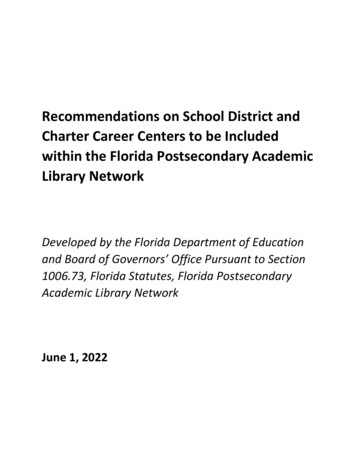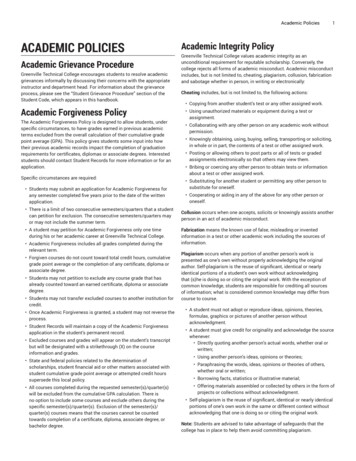
Transcription
Academic PoliciesACADEMIC POLICIESAcademic Grievance ProcedureGreenville Technical College encourages students to resolve academicgrievances informally by discussing their concerns with the appropriateinstructor and department head. For information about the grievanceprocess, please see the “Student Grievance Procedure” section of theStudent Code, which appears in this handbook.Academic Forgiveness PolicyThe Academic Forgiveness Policy is designed to allow students, underspecific circumstances, to have grades earned in previous academicterms excluded from the overall calculation of their cumulative gradepoint average (GPA). This policy gives students some input into howtheir previous academic records impact the completion of graduationrequirements for certificates, diplomas or associate degrees. Interestedstudents should contact Student Records for more information or for anapplication.Specific circumstances are required: Students may submit an application for Academic Forgiveness forany semester completed five years prior to the date of the writtenapplication. There is a limit of two consecutive semesters/quarters that a studentcan petition for exclusion. The consecutive semesters/quarters mayor may not include the summer term. A student may petition for Academic Forgiveness only one timeduring his or her academic career at Greenville Technical College. Academic Forgiveness includes all grades completed during therelevant term. Forgiven courses do not count toward total credit hours, cumulativegrade point average or the completion of any certificate, diploma orassociate degree. Students may not petition to exclude any course grade that hasalready counted toward an earned certificate, diploma or associatedegree. Students may not transfer excluded courses to another institution forcredit. Once Academic Forgiveness is granted, a student may not reverse theprocess. Student Records will maintain a copy of the Academic Forgivenessapplication in the student’s permanent record. Excluded courses and grades will appear on the student’s transcriptbut will be designated with a strikethrough (X) on the courseinformation and grades. State and federal policies related to the determination ofscholarships, student financial aid or other matters associated withstudent cumulative grade point average or attempted credit hourssupersede this local policy. All courses completed during the requested semester(s)/quarter(s)will be excluded from the cumulative GPA calculation. There isno option to include some courses and exclude others during thespecific semester(s)/quarter(s). Exclusion of the semester(s)/quarter(s) courses means that the courses cannot be countedtowards completion of a certificate, diploma, associate degree, orbachelor degree.1Academic Integrity PolicyGreenville Technical College values academic integrity as anunconditional requirement for reputable scholarship. Conversely, thecollege rejects all forms of academic misconduct. Academic misconductincludes, but is not limited to, cheating, plagiarism, collusion, fabricationand sabotage whether in person, in writing or electronically:Cheating includes, but is not limited to, the following actions: Copying from another student’s test or any other assigned work. Using unauthorized materials or equipment during a test orassignment. Collaborating with any other person on any academic work withoutpermission. Knowingly obtaining, using, buying, selling, transporting or soliciting,in whole or in part, the contents of a test or other assigned work. Posting or allowing others to post parts or all of tests or gradedassignments electronically so that others may view them. Bribing or coercing any other person to obtain tests or informationabout a test or other assigned work. Substituting for another student or permitting any other person tosubstitute for oneself. Cooperating or aiding in any of the above for any other person oroneself.Collusion occurs when one accepts, solicits or knowingly assists anotherperson in an act of academic misconduct.Fabrication means the known use of false, misleading or inventedinformation in a test or other academic work including the sources ofinformation.Plagiarism occurs when any portion of another person’s work ispresented as one’s own without properly acknowledging the originalauthor. Self-plagiarism is the reuse of significant, identical or nearlyidentical portions of a student’s own work without acknowledgingthat (s)he is doing so or citing the original work. With the exception ofcommon knowledge, students are responsible for crediting all sourcesof information; what is considered common knowledge may differ fromcourse to course. A student must not adopt or reproduce ideas, opinions, theories,formulas, graphics or pictures of another person withoutacknowledgment. A student must give credit for originality and acknowledge the sourcewhenever: Directly quoting another person’s actual words, whether oral orwritten; Using another person’s ideas, opinions or theories; Paraphrasing the words, ideas, opinions or theories of others,whether oral or written; Borrowing facts, statistics or illustrative material; Offering materials assembled or collected by others in the form ofprojects or collections without acknowledgment. Self-plagiarism is the reuse of significant, identical or nearly identicalportions of one’s own work in the same or different context withoutacknowledging that one is doing so or citing the original work.Note: Students are advised to take advantage of safeguards that thecollege has in place to help them avoid committing plagiarism.
2Academic PoliciesSabotage occurs when one purposely attempts to undermine theacademic work of another student or an instructor.Academic Misconduct ProcedureAn instructor having reason to believe that a student has committedacademic misconduct shall gather relevant information and materialsand complete the Academic Misconduct Referral Form (AMRF). Theinstructor shall communicate with the student within 5 college businessdays of learning of the academic misconduct to present the allegationand give the student an opportunity to refute it. When possible, theinstructor’s supervisor shall attend the meeting as a witness. Duringthe meeting, the student is expected to sign and date the AMRF. Theinstructor will establish an alternative process to sign the forms if themeeting is held virtually. If the instructor concludes the charge is valid,they will recommend a sanction and forward the AMRF and supportingdocumentation to the student and the academic dean within 2 collegebusiness days after the student meeting or discussion.The instructor may recommend one or more of the following sanctions:1. Assign a lower grade to the work;2. Require the student to repeat or resubmit the work;3. Assign a failing grade for the course; and/or4. Require the student to withdraw from the course;A student who commits academic misconduct, but is not enrolled inthe course where the work is assigned, may be charged with studentmisconduct, which will be referred to the dean of students in accordancewith Student Misconduct procedures.The academic dean will review the AMRF, as well as any college recordsof other misconduct, and either:1. Affirm the misconduct and the sanction;2. Affirm the misconduct, but change the sanction; or3. Disagree with the finding of misconduct and the sanction.The dean may impose higher sanctions, including suspension andexpulsion if deemed appropriate for repeated or persistent acts ofacademic misconduct at the college. The dean will forward the finalizedAMRF by certified mail and email to the student and copies to theinstructor and chief academic officer within 5 college business days fromreceipt of the form.The student may appeal the decision of the dean within 5 collegebusiness days of notice by sending an email to the chief academic officerusing their Greenville Technical College email address.If the misconduct is appealed, the chief academic officer will appoint adean not involved in the underlying decision as the “hearing officer.” Thehearing officer will handle the appeal and convene a hearing panel with 2faculty members (who shall not be from the program where the conductoccurred). The hearing shall be held within 10 college business days ofthe student’s request for appeal, absent extenuating circumstances. Allparties will be given 5 college business days’ notice of the hearing.The hearing will be closed to everyone except the parties and any relevantwitnesses. The student may bring one other person into the hearing, butthat person will not be allowed to address the hearing panel. Witnesseswill come into the hearing room one at a time. The panel may record thehearing but not the deliberations. No one other than the panel may takenotes, record or be given access to notes or recordings. The panel will usethe standard of “clear and convincing,” which means that the informationpresented shows that it is highly probable that the violation(s) occurred.The panel will make its decision by a majority vote for both violations andsanctions. The hearing officer will send a decision by certified mail andemail to the student, with a copy to the instructor and chief academicofficer within 2 college business days of the hearing.The decision of the hearing panel is final and not subject to furtherreview.To allow for extenuating circumstances, the chief academic officer hasthe discretion to adjust reporting and meeting deadlines associated withthe academic misconduct procedures.Whenever practical and reasonable, the student should be allowed toremain in class until the process is completed.Copyright and Intellectual Property RightsIn general, copyright is a form of legal protection extended to the creatorsof “original works of authorship,” including literary, dramatic, musical,artistic and certain other intellectual works. Copyright protection existsfrom the moment a work takes on a fixed form, and it pertains to bothpublished and unpublished works. United States Copyright Law generallygives copyright owners exclusive rights to reproduce the work; preparederivative works; distribute copies to the public by sale or other transferof ownership, or by rental, lease or lending; and, if applicable, perform,display or transmit the work publicly.Intellectual property (IP), in general, is a broader term defined aspatentable inventions, discoveries, processes, mass works, tangibleresearch property, trademarks, service marks, software and othercopyrightable works. It refers to any product of intellectual value thatis unique, novel, unobvious and/or original, or otherwise subject tocopyright or patent protection pursuant to Title 17 or Title 35 of the U.S.Code of Laws.The college does not claim ownership of intellectual property developedby students, faculty or staff who create original works or inventions ontheir own time using their own resources. The college may, however,retain whole or partial ownership when students, faculty or staffcreate intellectual property works in fulfillment of program or courserequirements or while using significant resources provided by thecollege. Additionally, students, faculty or staff may be required to waivetheir rights to intellectual property that is specifically developed foroutside entities as part of a course or other college assignment orresponsibilities. The college and outside entities may require a writtenownership agreement regarding intellectual property ownership androyalties. Additional information is available for copyright and intellectualproperty and may be viewed on the website at ademic StandingGreenville Technical College has implemented a progressive supportsystem to help students enrolled in curriculum programs maintain goodacademic standing. Student cumulative grade point averages (GPAs)are updated at the end of each term. Academic Standing notificationsare emailed to students who are no longer in Good Standing. Note thatstudents who receive financial aid may face additional consequencesthat should be discussed with the Office of Financial Aid.Academic Status will be determined as follows:
Academic PoliciesGood Standing — A student who ends a semester with a cumulative GPAof 2.0 or higher is considered in Good Standing.Academic Notice — A student whose cumulative GPA falls below 2.0 willbe placed on Academic Notice. It is highly recommended that a studenton Academic Notice meet with a success coach who will assist thestudent in identifying and implementing successful practices.Academic Alert — A student who is on Academic Notice but fails to earna cumulative 2.0 GPA for the next enrolled semester will be placed onAcademic Alert. These students will be required to contact their assignedadvisor to register for classes. The college recommends that AcademicAlert students take no more than 9 credit hours. A student’s successcoach will continue to assist in identifying and implementing successfulpractices.Academic Recovery — A student who is on Academic Alert but fails toearn a cumulative 2.0 GPA for the next enrolled semester will have twosuccess options:1. The student may decide to register for classes with the help ofthe Center for Student Advocacy. The college recommends thatAcademic Recovery students take no more than 8 credit hours. Thestudent’s success coach will continue to assist in identifying andimplementing successful practices. or2. The student may decide to take the semester off. The student willbe invited to an exit interview with the Center for Student Advocacywhere a plan will be developed to help the student remain engagedwith the college during the semester off and to help the studentreenter when ready.Academic Suspension — A student who is on Academic Recovery butfails to earn a cumulative 2.0 GPA for the next enrolled semester will besuspended from the college and will not be allowed to enroll for the nextsemester. The student will be invited to an exit interview with the Centerfor Student Advocacy where a plan will be developed to help the studentremain engaged with the college during the semester off and to help thestudent reenter when ready. Upon return to the college, the student will berequired to meet with the Center for Student Advocacy.Attendance PoliciesAttendance and participation are necessary for academic success. Thestudent’s record of attendance will begin on the first day of the course,even if registration occurs after the semester has begun. Students areexpected to attend and complete all scheduled instructional activities,both in class and online.A student may withdraw from any course up to the published deadline.If the student drops the course during the add/drop period, no coursetuition will be charged. If a withdrawal occurs after the drop/add period,tuition charges will result. Ceasing to attend class does not constitutean official withdrawal from the course and may result in financial aidconsequences. Refer to the Refund Policy (https://www.gvltec.edu/tuition-refunds/) for details.Administrative removal from a course: If a student preregisters for a course but subsequently does not meetthe prerequisite for the course, the college will delete the coursefrom the student’s schedule and notify the student of the change viaofficial email address. If a student registers for a course but fails to pay requisite tuitionand fees by the deadline set by the college, the college will delete3the course from the student’s schedule and notify the student of thechange via official college email address.Administrative withdrawal due to attendance: Never in Class (NIC): During the add/drop period, students will bewithdrawn if they do not attend class. If a student registers for acourse but fails to attend during the add/drop period (including failingto meet the criteria to be counted as present in an online course), thecollege will administratively withdraw the student from the courseand assign a grade of WA (Administrative System Withdrawal). Nocredits or grade points will be awarded and the WA will not affectthe GPA. The student will be responsible for course payment inaccordance with the college refund policy. The college will notify thestudent of the administrative withdrawal via the student’s officialcollege email address. For students receiving financial aid, thiswithdrawal will not count as a course attempt and will not affectfuture financial aid awards. 14-Day Rule: At any time during the semester and regardless of astudent’s use of financial aid benefits, the college will withdraw astudent who is not in attendance for 14 consecutive calendar daysincluding weekends, holidays, college breaks and canceled classsessions, and college breaks lasting four days or less. Breaks of fiveor more days will be excluded from the 14-day attendance count. Prior to the course last day to withdraw date, the college policy is toassign a grade of W (Withdrawn). No credits or grade points will beawarded and the W will not affect the GPA. For students receivingfinancial aid, the course will count as an attempt and may affectfuture financial aid awards. After the course last day to withdraw date, the college will assign agrade of WF (Withdrawn Failing) for the course, which will negativelyaffect the GPA calculation. The student will be responsible for coursepayment and will not be eligible for a refund. The college will notifythe student of the administrative withdrawal via the student’s officialcollege email address. For students receiving financial aid, the coursewill be recorded as an attempt and may affect future financial aidawards. Students who have been administratively withdrawn from a coursemay request reinstatement. Reinstatements must be approved by thecourse instructor.Administrative reinstatement into a course: A student who has been withdrawn from a course may requestreinstatement if the student notified the instructor of absences asthey occurred and has documentation to support those absences,if appropriate. Both the instructor and the department head mustapprove the reinstatement. Course, department and school policiesregarding making up course work will apply; the instructor’s decisionregarding missed work will be final. The college will charge a reinstatement fee in accordance with theTuition and Fee Schedule for each course for which reinstatement isapproved – 75 per course.With the approval of the chief academic officer, individual departmentsmay set attendance requirements that are more stringent than thosestated above if they are required by accreditation bodies or other similaroversight. Those requirements must be published in the course syllabus.It is the student’s responsibility to be aware of the course attendancepolicy.
4Academic PoliciesNote: Drops and/or withdrawals may affect the full-time or part-timeenrollment status of a student including, but not limited to, VA and otherfinancial aid benefits.Auditing a CourseA student who wants to enroll in a college credit course but who doesnot wish to earn academic credit may register as an auditor. Auditstatus must be declared at the time of registration or during the add/drop period. Audit students must meet all course co-requisites andprerequisites unless the assigned instructor has provided written consentto waive them. No credit is awarded for audited courses. Audited coursesmay not be used to fulfill prerequisite requirements for any course orprogram. A student may audit no more than 12 credit hours per semester.Auditing students are subject to the course attendance policy andmust pay all tuition and fees for courses in which they enroll. Federalregulations stipulate that students cannot receive financial aid forcourses being audited. The level of participation must be determinedbetween the auditor and instructor at the beginning of the course.The student will earn a grade of AU. Students receiving an AU maynot subsequently earn credit for that course through credit by anyexamination, but may subsequently register and take the course for creditin accordance with policies and procedures for repeating an academiccourse. Students may not audit any Developmental or TransitionalStudies courses.Note: Students who plan to transfer to other institutions should be awarethat many colleges and universities do not allow students to take coursesfor credit after receiving an AU for the course. Students should checkwith transfer institutions prior to auditing a course.Maximum Credit HoursA student is considered full-time when registered for at least 12 credithours during a fall, spring or summer semester. A student must petitionthe division/school dean to register for more than 18 credit hours duringthe fall or spring semester or for more than 15 credit hours during thesummer semester. A student’s academic status may influence themaximum allowable credit hours a student may take.Changes to Program RequirementsCourse substitutions and waivers must be approved by the student’sacademic program director.Dropping, Adding and Withdrawing fromCoursesStudents may drop courses during the add/drop period for each course;students may add courses during the same period only before the classactually meets. Courses dropped during this period will not appear on thetranscript. Students who withdraw from a course prior to the withdrawaldeadline will earn a grade of W for that course, and the W will be reflectedon the transcript. Refer to the college refund policy for informationconcerning refunds.Students should not assume that they will be administratively withdrawnif they stop attending classes. It is the student’s responsibility tocomplete the process to withdraw from a course or courses prior to thepublished withdrawal deadline. Students may withdraw from any or allcourses either electronically or through the Office of Student Records.Some students such as transient and career development students mustcomplete the withdrawal process through the Office of Student Records.Any hold on a student’s account (due to fines owed or similar obligationsto the college) will prevent a student from withdrawing electronically.The dates for add, drop and withdrawal are tied to the particular sessioncode and class section number as well as the start and end dates fora course. For example, a student who withdraws from a first sessioncourse and adds a second session course will incur tuition charges forthe second session course.Note: Students are responsible for meeting the posted course withdrawaldeadlines.Grade Point AverageA student’s grade point average is the equivalent of his or her average forcurriculum course work.Each letter grade has an equivalent point value: A — 4 points, B — 3points, C — 2, D — 1 and F — 0. A student may determine the grade pointsfor each course by multiplying the number of points a grade is worthtimes the number of credits the course carries. Thus, a B grade, worththree points, in a three-credit course is worth nine grade points; an Agrade in the same three-credit course is worth 12 grade points.The grade point average is found by adding the total grade point valuesfor all courses and dividing by the total number of credits attemptedduring the same period of time.Grading ScaleThe following grades are used in calculating Grade Point Averages:A— Excellent; earns credit hours; carries a value of four grade points percredit hour.B— Above average; earns credit hours; carries a value of three gradepoints per credit hour.C— Average; earns credit hours; carries a value of two grade points percredit hour.D— Below average; earns credit hours; carries a value of one grade pointper credit hour.F — Failure; earns no credit hours; carries zero grade points per credithour.Prerequisites — Any course listed as a prerequisite must be passed witha grade of C or higher before the subsequent course may be taken.Other Grades UsedAU — Audit; not used in GPA calculations; no credit or grade points.I — Incomplete; indicates some work is incomplete in a course. Thestudent is responsible for completing all unfinished course work no laterthan one week prior to the beginning of final exams in the next semesteror earlier as required by the course instructor. The student cannot reenroll in the class until the “I” has been replaced with a letter grade. The“I” will be changed to an F if all work is not completed satisfactorily bythe assigned deadline. “I” does not affect grade calculations and earns nocredit hours. Note: An incomplete does affect student financial aid.MI — Military Incomplete; refer to military service, duty, training ordisaster relief policy.NP — Grade recorded in lieu of a D or F earned in a course in which astudent elected the course Pass/Nonpass option; does not earn credit,not used in GPA.
Academic PoliciesNR — No Report; indicates no grade was submitted.P — Grade recorded in lieu of A, B or C earned in a course in which astudent elected the course Pass/Nonpass option; earns credit, not usedin GPA.S — Satisfactory progress equivalent to a grade of C or higher.S0 — Satisfactory completion through emporium, self-paced learning ofthe MAT 100 transitional studies course; earns credit, not used in GPA.S1 — Satisfactory completion through emporium, self-paced learning ofthe MAT 031 transitional studies course; earns credit, not used in GPA.S2 — Satisfactory completion through emporium, self-paced learning ofthe MAT 032 transitional studies course; earns credit, not used in GPA.S3 — Satisfactory completion through emporium, self-paced learning ofthe MAT 101 transitional studies course; earns credit, not used in GPA.S4 — Satisfactory completion through emporium, self-paced learning ofthe MAT 102 transitional studies course; earns credit, not used in GPA.S5 — Satisfactory completion through emporium, self-paced learning ofthe MAT 105 transitional studies course; earns credit, not used in GPA.TR — Transfer; given for certain equivalent Greenville Tech credits earnedat other colleges, universities or technical colleges with a grade of C orhigher. All TR grades must be supported by an official transcript of recordfrom an accredited post-secondary institution.U — Unsatisfactory progress equivalent to a grade of D or F.W — Withdrawn; no credits or grade points; used when a studentwithdraws or when an instructor withdraws a student due to excessiveabsences (see Attendance Policy).WA — Administrative System Withdrawal; no credits or grade points; usedwhen a student enrolled in a class but never attended (NIC).WF – Withdrawn failing. Failure due to absences; no credits but a gradepoint of zero for each credit hour will be used to calculate GPA. Usedwhen a student is not in attendance for 14 consecutive calendar days(including non-class days, holidays and weekends) at any time during thesemester including after the last day to withdraw.Note: Grades that appear on a transcript cannot be changed after onecalendar year.Note: The Office of Financial Aid may compute grade point averagesdifferently from academics, and the consequences of grades may vary foracademic and financial aid purposes.Transfer CreditThe college may accept comparable course-to-course transfer basedon demonstrated learning competencies consistent with GTC courses,programs of study and credit requirements.All transfer credits must be supported by an official transcript froma regionally accredited post-secondary institution or by specialagreement. An official transcript bears the institution’s seal, currentdate and appropriate signatures, and the issuing college must send itdirectly to GTC. The college will accept system generated electronictranscripts (ex. Parchment Exchange) that the issuing institution sendsto studentrecords@gvltec.edu.5The college may or may not accept course work from a non-regionallyaccredited institution. Additional documentation will be required forconsideration.Students requesting transfer credit from foreign institutions musthave official transcripts sent directly from the issuing institution to atranscript evaluation service accredited by the National Association ofCredential Evaluation Services (NACES). The transcript evaluation servicewill send a translated copy to the Transcript Evaluation Office. Thetranscript evaluation service will indicate whether the foreign institutionis adequately accredited and list letter grades and American hours earnedfor all courses. GTC will not accept English coursework from a foreigncountry unless it is the native language of that country.Credits that are accepted in transfer will be indicated by a grade of “TR”on the GTC transcript provided that the grade earned at the sendinginstitution is “C” or above. While a “TR” grade earns credit hours, it doesnot generate grade points and is not used in GPA calculations.GTC may accept transfer courses with a grade value of “pass” or“satisfactory” when the official transcript states that a “pass” or“satisfactory” is equivalent to a grade of “C” or higher.In general, GTC will consider courses for transfer regardless of age;however, some programs may restrict the age of courses accepted forprogram admission, prerequisites and/or program completion.Proficiency or credit by examination earned at another college oruniversity is non-transferable.To meet graduation requirements for a program at GTC, students mustearn at least 25% of the total credit hours of their program of studythrough courses taken at GTC. Transfer credit will not count toward the25%.The 2-5 Transfer of Credit policy and procedures may be found on thecollege website.Credit from Prior Learning Assessment(PLA)Greenville Technical College recognizes both traditional and nontraditional learning and may award credit to currently enrolled studentswhen learning can be documented to be substantially equivalent to aGreenville Technical College course needed for completion of a particularcredential.To meet graduation requirements for a program at Greenville Tech,students must earn at least 25 perce
Greenville Technical College values academic integrity as an unconditional requirement for reputable scholarship. Conversely, the college rejects all forms of academic misconduct. Academic misconduct includes, but is not limited to, cheating, plagiarism, collusion, fabrication and sabotage whether in person, in writing or electronically:


